AGGRIEVED PARISHIONERS.
[TO THE EDITOR OF THE "sertereros..-]
Sin,—In the Spectator of April 5 you observe that the true remedy for checking the sacerdotalism prevalent in so many parishes is to put more power into the hands of the parishioners. That this power might be used on either side is, as you suggest, a difficulty, though High-Church observances and dogmas are, I believe, chiefly sup- ported by priests and women. In large towns, the centres of intel- lectual life and spiritual earnestness, the laity might certainly do much towards maintaining the wise and moderate spirit so desirable in the National Church ; but English Churchmen have been so long accustomed to acquiesce in the action of their clergy, that it is to be feared it would be difficult to induce them to use the privileges you would put into their hands. In such towns, moreover, there is perhaps the least inducement for them to act at all. If his parish clergyman preaches the doctrines abjured by our fathers at the Reformation, and mimics the Romish priest in his postures and vestments, a walk of half a mile will take the town resident to a church in which. such dogmas and such practices are unknown. The country liver, on the contrary, is generally powerless, and can only escape from hearing and seeing what he abhors by absenting himself from church, or by wandering (which he is told is a dreadful ein) to the nearest. Dissenting chapel.
As an account of the difficulties of one aggrieved Churchman may be more pertinent than any remarks upon grievances in general, let me give you a case in point :- I am residing at a. rural parish in Sussex, the vicar of which, an easy, kind-hearted, elderly man, allows an earnest, energetic curate of the extremeat type of High Churchmen to minister in large measure to the spiritual necessities of the neighbourhood. There is but one obstacle apparently which keeps this curate from join- ing the Romish Church. He does not acknowledge the claims of the,Pope; in all other respects he declares the Church of Rome and the Church of England to stand on the same footing as two branches of the one Church. The Romish mass differs only in name from our Holy Communion or "Sacrifice of the Altar," and this.doctrine, although according to the Prayer Book to beabhorred of all.faithfui Christians, is pronounced to be the end and aim of all worship.
Auricular confession, penance, and priestly absolution are en- joined as necessary or almost necessary to salvation, and all our blessings as Christian men must come to us through priestly hands. These and similer doctrines familiar to everyone who has studied tine-Romish controversy may be heard any day, and almost every day, in the pretty Sussex village of which I am writing, and which I am bound to say is most sedulously cared for by its clerical overseers. Is there any remedy for aggrieved parishioners in an instance like this ? I confess I do not see one, and for this reason, that the greater number of the parishioners, even if more power were granted them, are far too ignorant to use it. When they are told that the sacrifice of the altar has been believed in by the Church from primitive times, and always maintained in England, how many of them are likely to know the error of this assertion, or to remember the many faithful men and women who endured martyrdom rather than accept this doctrine? The few who are well informed are, perhaps, indifferent, or would not care to be mixed up in what might prove a parish squabble ; and so it comes to pass that the clergyman, if he be an earnest, zealous man, can do very much what he pleases. It may be said that I am forgetting there are Bishops in the Church of England, whose special duty it is " to drive away all erroneous and strange doc- trine contrary to God's Word." I remember the fact perfectly, but if I have little hope of a check to the growth of sacerdotalism from our country laity I have still less expectation of assistance from the rulers of the Church.—I am, Sir, &c., A LA.rmAx.


































 Previous page
Previous page